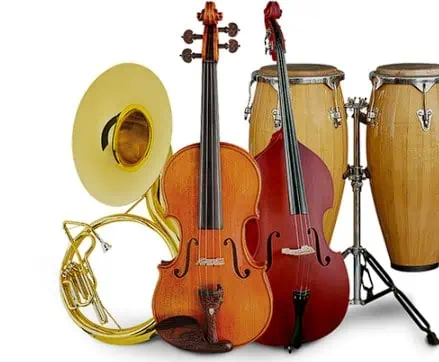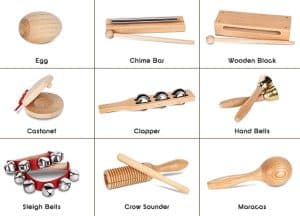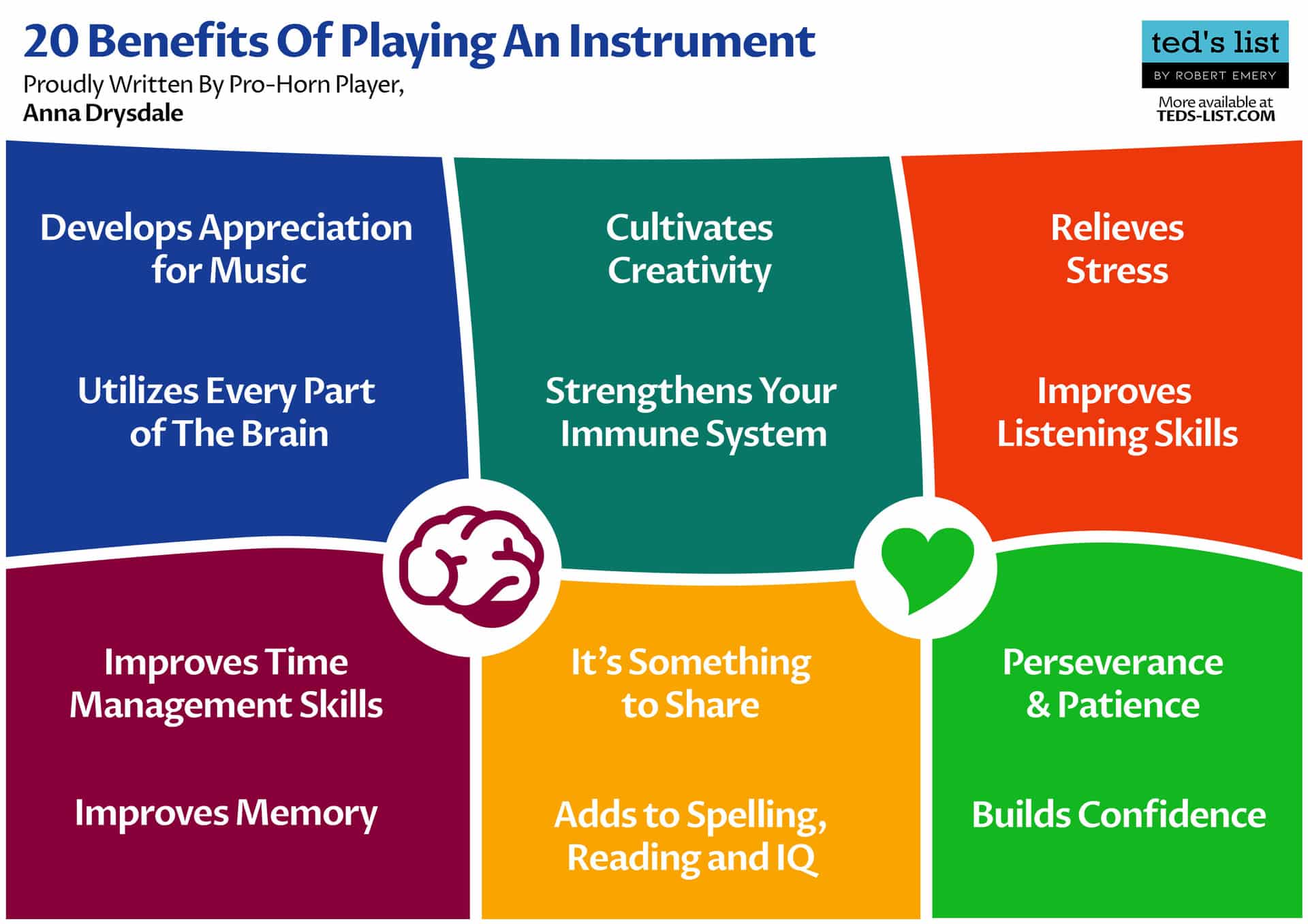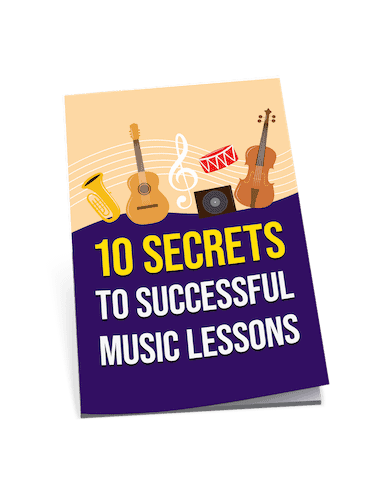Wondering why everyone’s buzzing about the perks of playing an instrument lately?
It’s not just about making great sounds; it’s about boosting your brain and well-being. Whether strumming a guitar or playing the piano, making music fires up your brain, improves memory, sparks creativity, and helps you connect with others.
So, pick up that instrument you’ve been eyeing and discover the joy of expressing yourself through music. Playing music is a stress-relieving, brain-boosting activity that brings happiness and confidence.
Are you Ready to discover all the fantastic ways playing an instrument can improve your life? Let’s explore and uncover the exciting perks waiting for you!
Develops appreciation for music
When you play an instrument and have a certain amount of musical ability, it means you can develop music appreciation from an insider’s perspective. It can be really exciting hearing your instrument being played in an ad or a film, and you’ll probably notice the music more in these things, too
Cultivates creativity
Music encourages us either to create music or to create moments. If you compose music, you are doing the former. If you are thinking about whether a passage should be big and bold or small and understated, you create an experience. Musicians have the ability to create emotions and beauty, angst, or drama. All of which are creative!

Health benefits of playing an instrument
Relieves stress
Playing music is fun and can be really absorbing. It’s the perfect activity to relieve stress.
Practicing or playing in a band or orchestra requires a lot of concentration, which reduces stress by crowding it out and leaves little space for negative thoughts.
Plus, for most amateur musicians, music is a world away from any potential stress in your job.

Strengthens your immune system
This may sound tenuous to you, but it has actually formed the basis of a study.
The study in question showed that listening to music of any kind has real health benefits and can induce relaxation, heighten levels of antibodies, and lower cortisol levels in the body. It’s preliminary research that will require further studies to take place, but it’s certainly promising.
There are worse ways to lower your blood pressure!
Physical benefits of playing an instrument
Utilizes every part of the brain
Numerous studies have shown that learning to play a musical instrument can enhance your verbal memory, develop your spatial reasoning, aid hand-eye coordination & motor skills and improve your literacy. And it uses all those parts of your brain at once!
And often musicians have to remember things – be it instructions from a rehearsal, learning our scales or playing music by heart. We know memory is a skill that can be trained – perhaps musicians are naturally training it all the time.
Improves listening skills
Listening as a musician directly parallels “normal” listening. Playing music in an orchestra, you might have to try and fit your part in with another section – and both work together to make sure you’re listening to each other.
Even in your lessons, while learning how to play your instrument, you have to listen carefully to a teacher in a one-to-one situation and try to do what they say.
So while non-musicians may regard listening as a lost art, musicians are listening all the time – a sure-fire way to improve your listening skills.
Improves time-management skills
When you learn to play a musical instrument, you have to fit practice into your daily life. Realising that you can almost always slot 20 minutes of practice into a typical day is a crucial lesson about time management – if you can keep a musical instrument as a habit, what else could you change about your life?
Successful musicians are good at prioritising what’s important, e.g. difficult sections of the music, exposed passages or a particular weakness they need to solve in order to give their best performance.

Gives you something to share with others and improves your social life
One of the best parts of playing a musical instrument is being able to play in a band, orchestra or other ensembles. Many children meet others when playing music together and become lifelong friends.




Mental benefits of playing an instrument
Utilizes every part of the human brain
Playing music is a hugely complex art, perhaps more so than many other things humans do. There’s the physical side, the psychological performance side, the skills you have to learn and the creative side.
There are so many complex details to learn in music that they inevitably take time and effort to develop. While this is happening, the player needs to exercise huge amounts of patience and perseverance. Taking part in interactive music classes develops music appreciation, that in turn, can help with many things, from your immune system (yes really!) through to age related hearing loss, and gaining a significantly better verbal memory.
Learning to fail, get up and try again is a skill that builds a real sense of resilience or “grit” in an individual. When it is framed in the right way, coping with rejection or failure can really build courage.
Increases memory capacity
There have been many studies that have shown music improves memory in some capacity.
A recent study in Chile compared children with a musical education (i.e. taking instrumental lessons) to those without extra-curricular musical training. The “musical children” (who took instrumental lessons) significantly outperformed the non-musicians on memory tasks.
Children who practice an instrument are frequently encouraged to memorise pieces and scales…and often need the discipline to repeat passages in a piece of music as part of their learning over and over again, meaning that the process of playing music often involves a lot of learning through repetition.
Some students, such as those educated in the Suzuki method, do a lot of playing by ear, which in the absence of written music requires the use of memory to retain the music instead of reading it.
Benefits spelling, reading and IQ in children
There is a correlation between learning how to play an instrument and higher IQ, one of the studies that explored this was by Glenn Schellenberg at the University of Toronto. 144 first-graders were given one of the following: free keyboard lessons, free voice lessons, free drama lessons or nothing at all.
All groups showed improvement in IQ (natural over the course of a school year), but the music groups showed significantly more than any other group.
The study didn’t go into why they think this happened, but Schellenberg’s working theory was that music puts a lot of emphasis on useful brain skills for general intelligence: memory, concentration, practising a skill, understanding a new “language” etc.
A number of studies in quick succession over the last ten years have found that learning music benefits students in spelling tests, largely because it benefits them in auditory processing, vocabulary, verbal memory…in layman’s terms, anything language-y. Students can visit studycrumb, or similar services, for more practical writing tips and free tools to help them do just that.
So basically, it looks like all of the areas of the brain involved in language are in some way impacted by musical training.
Again, this is one of those links where the reasons for it aren’t fully understood, but there’s a big enough body of evidence to suggest that learning music has huge academic and cognitive benefits for those who study it.
Emotional benefits of playing an instrument
Builds confidence
There are inevitably opportunities to perform in music – and lots of them, at many different levels. Your first performance might be with a choir of 100 children (breaking you in gently).
Over a lifetime of performing, these experiences might build in intensity, from the aforementioned lower-pressure group concerts to orchestral concerts where you have a short solo and all the way up to solo recitals. And every sense of achievement builds confidence. Many young people come out of their shells through playing in public, and low-stakes performing can be a way to start this process. It’s a way of improving your everyday life, not only your mind set.
Some people also grow in confidence because music provides a way for them to express emotions that they would struggle to speak out loud.
Music isn’t just the preserve of limelight-loving extroverts – there are many quiet, introverted people who would rather stand up on stage with an instrument in front of them and play than talk about themselves at length to a group of people.
And music is often used in projects with non-verbal people or refugees who may not speak the languages spoken in their new country of residence – music has become a universal language.
20 Benefits Of Playing An Instrument
Summary
Playing musical instruments is more than just a hobby; it’s a transformative experience. As I’ve explored, it offers many benefits that impact our brains, emotions, and social lives.
- From boosting cognitive functions like memory and reaction speed, it’s clear that music sharpens the mind. It’s never too late to start, and the brain’s plasticity means benefits at any age.
- Emotionally, the ability to play an instrument provides a unique outlet for stress reduction. Music allows me to express myself in ways words can’t always capture.
- Socially, it’s a fantastic connector. Jamming with others or simply sharing performances fosters connections and strengthens relationships.
- Learning an instrument also improves fine motor skills and comprehension of complex concepts. This is notably seen in the understanding of rhythms and fractions.
In summary, picking up an instrument is a rewarding journey that enhances various aspects of life. Each instrument offers challenges and rewards, whether it’s a piano, guitar, or violin.
So why wait? Grab an instrument and start reaping these excellent benefits today!
And remember, if you’re not sure what instrument to play, then check out our 10 Tips To Figure Out What Instrument To Play article here.
FAQ's
In a nutshell: if you play an instrument, you enhance your mind, build your confidence, have fun, build life skills and improve your social life! The process of learning an instrument can teach you many skills (time management, memorization, perseverance), and the better you get, the more rewards there are in other areas of life.
Learning to play music can help increase your IQ; it combines a range of different mental skills (memorisation, motor skills, focus) and works on all of them. The brain of any musician, particularly those who have trained since a young age, are highly developed in various areas: the corpus callosum ( the bridge that connects the two halves of the brain), the auditory cortex (that’s for sound), the motor cortex (that’s for movement).












wow
Recently, I’ve developed a strong desire to take piano lessons, driven by a lifelong dream of playing this beautiful instrument. The inspiration came after attending a friend’s recital and witnessing the joy and fulfillment that playing the piano brought into their life, sparking my determination to embark on my own musical journey. I will just keep in mind that even in one-on-one classes when learning how to play your instrument, you have to pay close attention to what your teacher says and attempt to follow their instructions.
Thanks Lily. I agree fully!
I’m pleased you told us that playing an instrument may help promote calm, raise antibody levels, and reduce cortisol levels in the body because I never would have imagined that it might help boost our immune system. I’ve had the desire to learn how to operate the drums, so now that I’m free to do so, I’m considering taking formal lessons. I’ll make sure to pick a qualified and knowledgeable teacher to provide me with the courses I require.
I never would have thought that playing an instrument can help strengthen our immune system, so I’m glad you informed us that it can help induce relaxation, heighten levels of antibodies, and lower cortisol levels in the body. I’ve always wanted to learn how to play the drums, so I’m thinking of getting proper lessons soon now that I’m free to do so. I’ll be sure to choose a skilled and experienced instructor to give me the lessons I need.
Thanks for the comment Elina. It’s amazing what music can do!